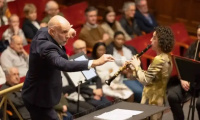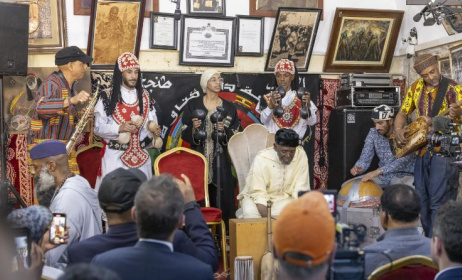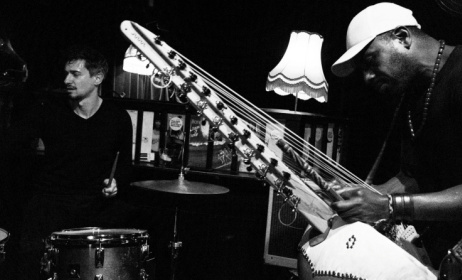New documentary ‘rediscovers’ SA jazz exile Ndikho Xaba
A new film tells the extraordinary story of South African multi-instrumentalist, music historian and philosopher Ndikho Xaba, a man who has dedicated his life to music and to Africa.
 South African jazz musician Ndikho Xaba in 2015. Photo: Mind Your Head
South African jazz musician Ndikho Xaba in 2015. Photo: Mind Your Head The poster for the new documentary, 'Shwabada'.
The poster for the new documentary, 'Shwabada'. The cover of the original 1970 album, 'Shwabada'.
The cover of the original 1970 album, 'Shwabada'.
Xaba is an actor, composer, and pianist; he also plays an array of musical instruments, both African and western – some of his own design and innovation, including variations of ancient instruments such as umakhoyane, ugubhu and others.
His first public performance in 1960 in Mkhumbane, a musical written by Alan Paton and Todd Matshikiza, set in motion events that culminated in his exile in the USA. In between acting and playing music in the 50s, Xaba spent his time on the run from the notorious South African Police Special Forces, until he finally left the country in 1964 with Alan Paton’s play Sponono, the first South African play on Broadway in New York.
Like many other South African musicians during apartheid, Xaba spent several decades in exile, living in the USA, Canada and Tanzania, among other places. He did not return to South Africa until 1998. His time in Chicago and his subsequent return to South Africa render precious insights into the history of South Africa’s performing arts.
From his roots playing an organ at home to international stages (some shared with the American legend Sun Ra), Xaba created music described as spiritual, eclectic and ground-breaking. In 1970, as the leader of Ndikho Xaba & The Natives, a band based in San Francisco, California, Xaba released an inventive record of exceptional musicianship, seeped in the African and spiritual traditions of the jazz avant-garde. The album, titled Shwabada, was long considered the ‘holy grail’ among jazz record collectors.
In 2015 it was re-issued by Matsuli Music, making it available to a new generation of listeners. According to the label, the album is “arguably the most complete and complex South African jazz LP recorded in the USA,” a recording that “stands out as a critical document in the history of transatlantic black solidarity and in the jazz culture of South African exiles” and “opens a fluid channel of sonic energy that courses between two liberation struggles and two jazz traditions, making them one.
“It is a critical statement in the history of transatlantic black solidarity, unifying voices stretching from San Francisco to Johannesburg. There is no other recording or group in which the new jazz spirituality of the late 1960s is so fully blent with an African jazz tradition,” elaborates the label.
Now this landmark album is at the centre of a new documentary film that paints an intimate portrait of an African artist. Also titled Shwabada, the film is a cinematic inquiry into the art of this influential yet relatively unknown South Africa composer. Directed by Nhlanhla Masondo, the film loosely follows the structure of his 1970 album to explore Xaba’s story and his art.
The film doesn’t follow a conventional life-chronology but is instead guided by the music itself. The story of this particular record goes further back than simply to when it was recorded in California. It goes back to South Africa and KwaZulu-Natal, where Xaba’s life began in 1934. In doing so the documentary navigates the vast universe of theatre and jazz to “find” this enigmatic musician.
The film features rare archival footage of Xaba’s early performances, as well as accolades from some of South Africa’s greatest musical icons.
Shwabada will have its world premiere at the Encounters Documentary Festival, which takes place from 2 to 12 June. The film will be screened in Cape Town at the V&A Waterfront on Saturday 4 June at 6pm, and on Sunday 12 June at the Bioscope in Johannesburg at 3.30pm. Both screenings will include a Q&A session with the director. For more details visit the Encounters website.

































Comments
Log in or register to post comments